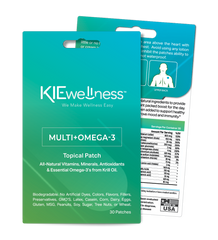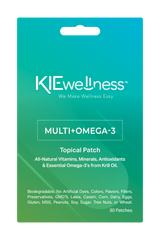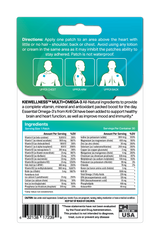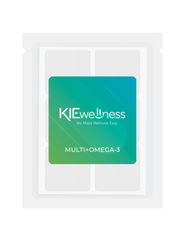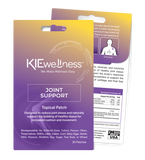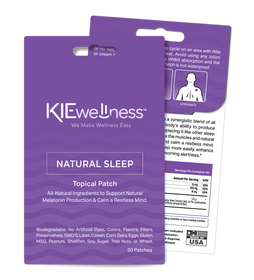Description

MULTI+OMEGA-3
DESCRIPTION: KIEwellness Multi+Omega-3 All-Natural ingredients to provide a complete vitamin, mineral and antioxidant packed boost for the day. Essential Omega-3’s from Krill Oil have been added to support healthy brain and heart function, as well as improve mood and immunity.*
Biodegradable. No Artificial Dyes, Casein, Corn, Colors, Dairy, Eggs, Fillers, flavorings, Gluten, GMO’s, Latex, MSG, Peanuts, Preservatives, Soy, Sugar, Tree Nuts, or Wheat.
DIRECTIONS: Apply 1 patch to an area above the heart with little or no hair - shoulder, back or chest. Avoid using any lotion or cream in the same area as it may inhibit the patches ability to stay adhered. Patch is not waterproof.
--
INGREDIENTS:
- Vitamin E (as d-alpha tocopherol): Vitamin E is a family of fat-soluble compounds. It occurs naturally in eight different forms, including four tocopherols (alpha, beta, gamma and delta) and four tocotrienols. Alpha tocopherol is the most common and most potent form of the vitamin. As a fat-soluble nutrient, Vitamin E functions mainly as an antioxidant, which means it helps protect cells from damage caused by unstable molecules called free radicals.
- Vitamin D3 (as cholecalciferol): Vitamin D which is considered a miracle nutrient for your immune system, as it enables your body to produce well over 200 antimicrobial peptides, which are indispensable in fighting off a wide range of infections. Vitamin D3 enhances calcium and phosphorous absorption, stimulates the synthesis of osteocalcin (an important structural protein in bone), and is involved in proper cell differentiation and immune response.
- Vitamin K2 (as menaquinone-7): Vitamin K2 belongs to a group of Vitamin K compounds called menaquinones, which show greater bioactivity when compared to Vitamin K1. K2 is absorbed more completely, remains in the body longer and delivers more benefits for bones, blood vessels, and other soft tissues. One of its most important functions is to regulate calcium In other words, it promotes the calcification of bones and prevents the calcification of blood vessels and kidneys.
- Vitamin B3 (as niacin): Vitamin B3 and all other B vitamins help the body convert food (carbohydrates) into fuel (glucose), which the body uses to produce energy. These B vitamins, often referred to as B-complex vitamins, also help the body use fats and protein. B-complex vitamins are needed for a healthy liver, healthy skin, hair, and eyes, and to help the nervous system function properly. Niacin also helps the body make various sex and stress-related hormones in the adrenal glands and other parts of the body. Niacin helps improve circulation, and it has been shown to suppress inflammation.
- Vitamin B6 (as pyridoxine HCl): Vitamin B6 is a water-soluble vitamin and is one of the B vitamins that benefits the central nervous system. It is involved in producing the neurotransmitters serotonin and norepinephrine, and in forming myelin. Other functions of Vitamin B6 include protein and glucose metabolism, and the manufacture of hemoglobin. Hemoglobin is a component of red blood cells. It carries oxygen. Vitamin B6 is also involved in keeping the lymph nodes, thymus and spleen healthy.
- Folic Acid (as 5-Methyltetrahydrofolate): Folic Acid is used for the production of DNA and red blood cells. It supports brain and nervous system function and benefits mental health. Folic Acid is also needed for protein metabolism and may support cardiovascular health.
- Vitamin B12 (as methylcobalamin): Vitamin B12, also known as cobalamin, is a water-soluble B vitamin essential for carbohydrate metabolism and energy production. It also plays an important role in the formation of healthy red blood cells. Vitamin B12 may also benefit your body in impressive ways, such as by boosting your energy, improving your memory and helping prevent heart disease.
- Calcium (as calcium citrate): Calcium is the most abundant mineral in the body and is essential for neurotransmitter production and release, blood clotting, muscle contraction and cardiovascular function. About 99% of the calcium in the human body is in the bones and teeth. Calcium is essential for the development, growth, and maintenance of bone.
- Iron (as iron bisglycinate): Iron is a critical component of hemoglobin‚ the main oxygen-carrying compound in the blood‚ and therefore a prerequisite for adequate oxygen supply to the cells. Iron is also required for energy production and collagen synthesis.
- Magnesium (as magnesium citrate): About 60% of the magnesium in your body is found in bone, while the rest is in muscles, soft tissues and fluids, including blood and every cell in your body contains it and needs it to function. One of magnesium's main roles is acting as a cofactor or helper molecule in the biochemical reactions continuously performed by enzymes. Magnesium is involved in more than 600 reactions in your body, including energy production, protein formation, gene maintenance, muscle contraction and nervous system regulation.
- Zinc (as zinc citrate): Zinc is called an essential trace element because very small amounts of zinc are necessary for human health. Zinc is needed for the proper growth and maintenance of the human body. It is found in several systems and biological reactions, and it is needed for immune function, wound healing, blood clotting, thyroid function, and much more. Zinc plays a key role in maintaining vision, and it is present in high concentrations in the eye. Zinc also has been shown to have effects against certain viruses including rhinovirus (common cold) and herpes virus.
- Selenium (as l-selenomethionine): Selenium is an essential trace mineral that is important for many bodily processes, including cognitive function, a healthy immune system, and fertility in both men and women. Selenium contributes to thyroid hormone metabolism and DNA synthesis, and it helps protect against oxidative damage and infection. Selenium acts as a powerful antioxidant and may reduce your risk for certain cancers.
- Potassium (as potassium chloride): Potassium is the third most abundant mineral in the human body. Roughly 98% of the potassium in your body is found in your cells. Of this, 80% is found in your muscle cells, while the other 20% can be found in your bones, liver and red blood cells. Once inside your body, it functions as an electrolyte. When in water, an electrolyte dissolves into positive or negative ions that have the ability to conduct electricity. Potassium ions carry a positive charge. Your body uses this electricity to manage a variety of processes, including fluid balance, nerve signals and muscle contractions.
- Boron (as boron amino acid chelate): Boron is a trace element found naturally in leafy green vegetables like kale and spinach. Boron helps your body metabolize key vitamins and minerals, has a key role in bone health, and it also affects estrogen and testosterone levels. Boron is known to play a role in extending the half-life of Vitamin D.
- Antarctic Krill Oil: Krill Oil contains fatty acids similar to fish oil. These fats are thought to be beneficial fats that decrease swelling, lower cholesterol, and make blood platelets less sticky. When blood platelets are less sticky they are less likely to form clots. Krill Oil has been shown in clinical studies have shown that it can help to support joint comfort and may help to maintain healthy feminine balance.
- Astaxanthin (Haematococcus pluvialis): Astaxanthin is a pigment belonging to the carotenoid family and is a natural antioxidant which has been shown to promote a healthy inflammatory response, support skin during exposure to sunlight and support joint and eye health.





